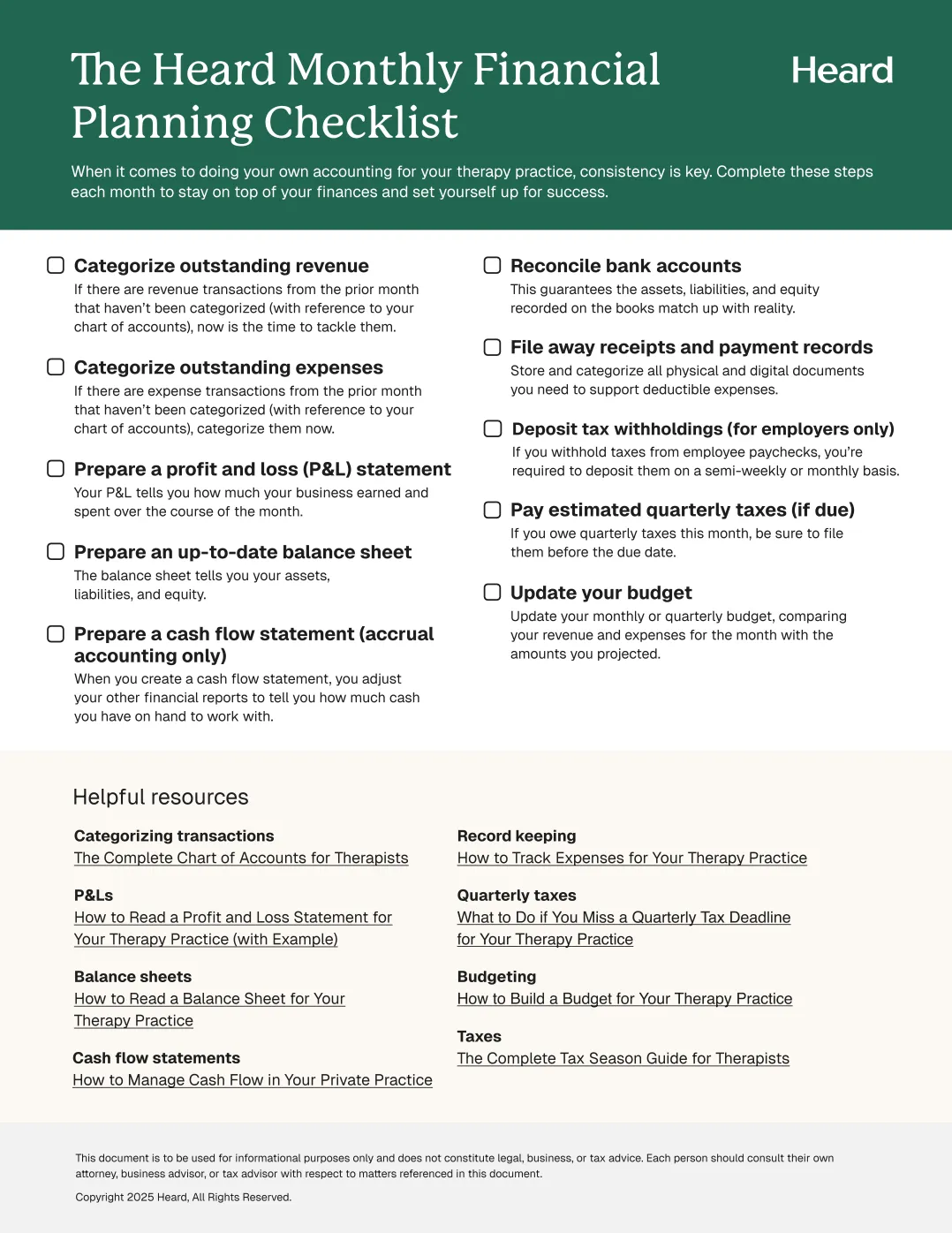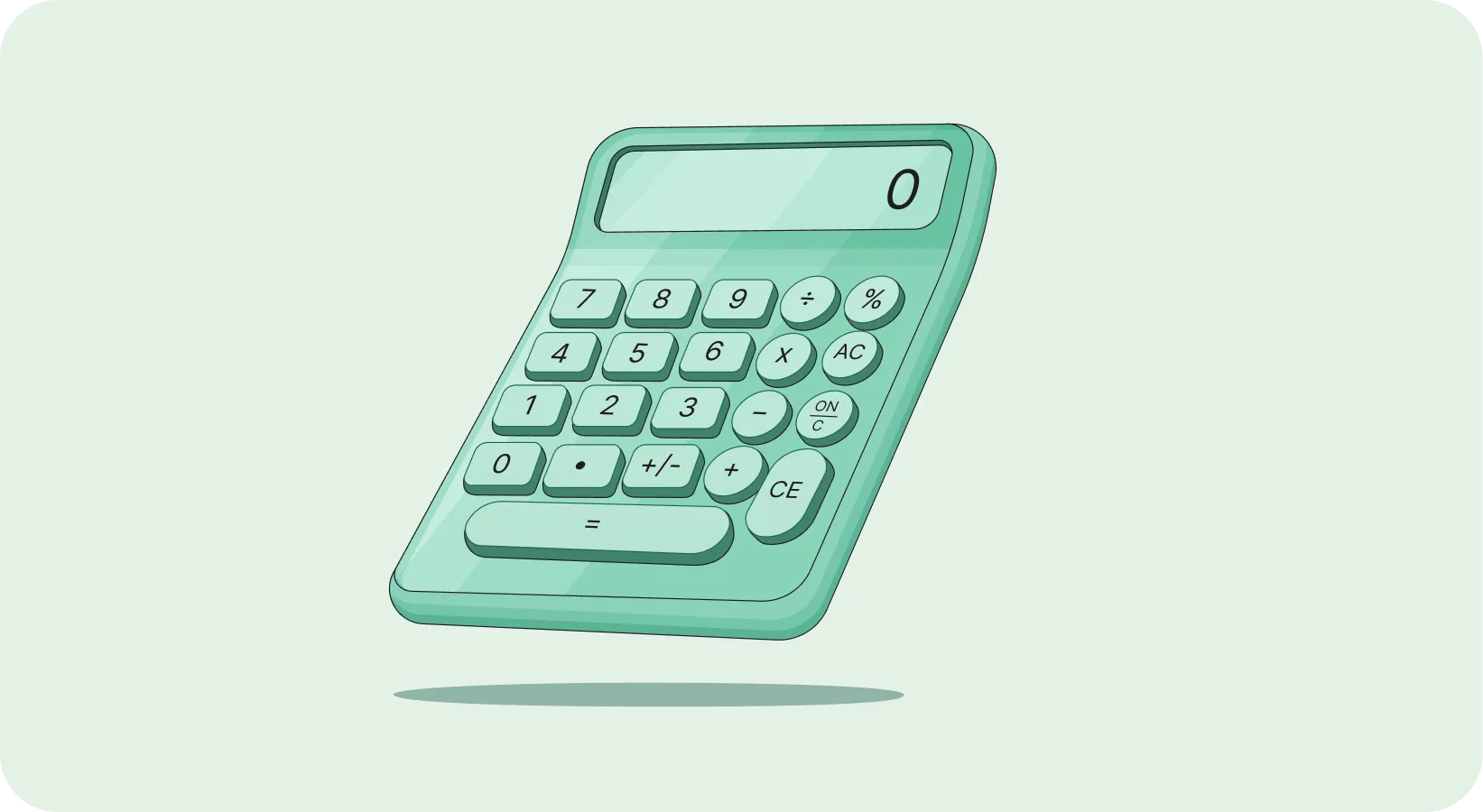On one hand, going over your therapy practice finances could provide you with valuable information and support you in feeling confident in your ability to manage your business.
On the other hand, that process could be the reason you’re regretting going into private practice and reconsidering all your choices.
As a bookkeeper, I work with clients who see positive results with just a few changes in their routine. Because, after all, looking at your numbers is only one part of the journey (one of the very last ones, actually).
Here are a few tips to create space for your finances as a self-employed therapist.
{{resource}}
Set up a system for your therapy practice finances
Having the necessary tools, systems, and processes for gathering your financial data is the very first step to having accurate results.
This means that even if you have a great bookkeeper or accountant by your side, the information you provide them is still necessary for the numbers to be as accurate as possible.
Contrary to popular belief, your numbers should not be the result of “I-hand-my-statements-and-they-file-my-taxes” kind of deal. A healthy professional relationship with your accounting team thrives on collaboration and communication before expertise and knowledge.
If you are keeping up with your bookkeeping on your own using software, remember that your software assumes you know what you’re doing. One of the biggest mistakes therapy practice owners make is believing Quickbooks will automatically categorize things for you without your input. This is far from the truth.
Yes, automation exists and it’s massively helpful in the process, but it is not meant to replace your judgment and basic knowledge of accounting and bookkeeping.
You’ll reap two benefits from having your basics covered.
The first and most tangible one is the ability to access financial information with just a few clicks. This means you’ll be able to catch any mistakes, fraudulent charges, analyze your profit, be ready for tax season, and many other metrics.
The other benefit is that this process will continually challenge you to maintain a proper and efficient workflow for your back office tasks.
Don’t be afraid to ask your bookkeeper or accountant questions
When it comes to finances (and arguably everything in life), one of the worst feelings is to be in the dark.
What can you do about it? Keep a “Q&A” for your bookkeeper or accountant note on your phone or computer (or any method that is easily accessible). As you run into questions about your numbers, optimizing the accounting process, or taxes, jot them down. Keep the pressure off.
You don’t need to show this document to anyone, so don’t worry about “sounding accurate” or using accounting words. The goal is for you to know what questions to ask.
This will prompt you to analyze your relationship with your current bookkeeper or accountant, and the value they provide to your practice. If you’re not satisfied with it, think about what values, processes, and results are important and necessary to you. Start by having a conversation with them and see if they offer what you’re looking for.
Generally speaking, bookkeepers and accountants are interested in your well being and want to see you succeed. Don’t let the stigma make you feel like you can’t ask questions, because (again, generally speaking) we welcome those and will happily answer them for you.
Like finding a therapist, shop around if necessary, since the services provided vary greatly between accounting firms and professionals.
{{resource}}
Show up with a financial goal in mind
When showing up to your money meeting or financial review session, come prepared with a few questions in mind.
Here are a few examples:
- What do you want to know about your numbers this specific time/day?
- Are you interested in wanting to know how much you’re paying your employees/contractors?
- How much profit did you make last month?
- Do you have room to pay yourself more?
- How much are you paying on overhead every month?
- How much should I have in savings to cover X months worth of expenses?
- [Insert yours here]
Don’t fall into overcomplicating this step. Sometimes, when we think that something is complicated, we unconsciously force it to be complicated for it to fit our expectations. You’ll want to start with only a few simple questions, and you can always work your way up as you feel more comfortable.
Think of this moment as trying to connect the dots between where you currently are financially and where you want to be, and the why and what behind those totals. Or the map between your questions and the source of where the answers are in the actual software. Become familiar with clicking around and getting more detailed numbers.
Pro tip: The more data you have, the more information you’ll be able to get. As you get more comfortable with this step, add more periods of time to your financial reports. Showing up with the end in mind will guide your eyes to the right place in that long list of numbers. Without that direction, you’ll feel lost and the feeling of confusion and overwhelm will most likely sabotage this session.
Try “habit stacking” your financial tasks
Choosing the right day and time, decluttering your space, having a nice drink/coffee, and improving your surroundings with music, candles, or anything else that makes you feel good all play an important role. The goal is for you to feel like this is a good thing.
In other words, adjust your environment and the time you show up in a way that will have a positive impact on you, and that will make you want to come back next month.
Have you heard of habit stacking? James Clear talks about it in his book, Atomic Habits. This principle states that by pairing a new habit with one that is already established, you will make it easier on yourself to actually get it done.
For example, if you know that every Wednesday you sit in your car during your kids soccer practice, you can use that time to work on your bookkeeping, to sort out receipts, or generate reports.
Similarly, if you routinely meet with a colleague, schedule “CEO time”, or any other similar activity, plan to go over your numbers right before.
Write down what you’re learning about your finances
Did you have any aha moments while looking at your numbers? Did you end up with more questions? Take one or two minutes to write it all down!
If you’re working with a business coach, or have learned a few business lessons that you’d like to implement, this information will likely give you some pointers as to how to make your way through those plans. You can also bring those notes to your next coaching session, or meeting with your bookkeeper or accountant.
The purpose of this step is to help you feel like you’re having closure about this process. Writing down results, adding them to sticky notes, brainstorming about future goals, deciding what your next move is, are all great ways to end that session.
Think of one or two that feel right to you at that moment. Turn those thoughts into actions whenever possible and follow up next time you sit down with your numbers.
Feeling like this process has a beginning and an end will, over time, help you feel like this is actually attainable and that you are, in fact, achieving something. It will also help remove the pressure off your shoulders to mentally keep track and remember everything.
Having a process that fits your therapy practice goals, your current needs, and that supports how you obtain your results will make it easier on you to be consistent with it. Start small, start today.
—
This post is to be used for informational purposes only and does not constitute legal, business, or tax advice. Each person should consult their own attorney, business advisor, or tax advisor with respect to matters referenced in this post.
Andrea is a bookkeeper and the owner of Liquid Cents Bookkeeping. She supports women business owners who want to build wealth and whose mission is to help others. She lives with her husband and kids in South Florida.
{{cta}}
Manage your bookkeeping, taxes, and payroll—all in one place.

Discover more. Get our newsletter.
Get free articles, guides, and tools developed by our experts to help you understand and manage your private practice finances.





